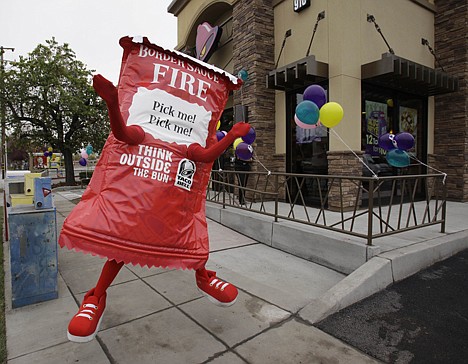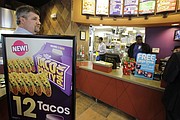There's the beef
Bruce Schreiner | Hagadone News Network | UPDATED 15 years AGO
Taco Bell says a legal beef over the meat in its tacos is bull.
The fast-food chain took out full-page ads in at least nine major newspapers and launched a YouTube campaign featuring its president Friday to proclaim its taco filling is 88 percent beef.
A false-advertising lawsuit filed last week that caused an online stir alleges the company's filling doesn't have enough beef to be called that. The lawsuit seeks to make the company stop calling it "beef," and pay the suing law firm's bill.
Taco Bell trumpeted "Thank you for suing us. Here's the truth about our seasoned beef," in the ads in Friday's editions of the Wall Street Journal, USA Today and other papers.
The ads go on to say the rest of the filling is a mixture of spices and common food additives.
The lawsuit, filed in federal court in California, alleges the meat mixture has binders and extenders and does not meet federal requirements to be labeled beef.
Taco Bell denied those claims earlier this week but turned up the volume after a week in which the story spread like wildfire, making national headlines, creating an internet stir and even prompting a bit by comedian Stephen Colbert.
Experts say similar cases show the tempest in a tortilla is unlikely to hurt Taco Bell's business, but the aggressive counter-attack is drawing some attention.
"It is unusual for a company to take this on and challenge the allegations so boldly," said Gene Grabowski, chair of the crisis and litigation practice at Levick Strategic Communications in Washington. "A lot of companies are going to be watching how this turns out."
The tone and scope of the campaign indicates Taco Bell is confident in its facts, Grabowski said. Companies typically shy away from taking facts in a legal dispute public.
The lawsuit, filed by the Alabama law firm Beasley, Allen, Crow, Methvin, Portis & Miles, doesn't specify what percentage of the mixture is meat. The lawyer on the case, Dee Miles, said the firm had the filling tested and found it contained 35 percent beef. The firm would not say who tested the meat or give any other specifics of the analysis.
Taco Bell says the filling contains 88 percent USDA-inspected beef and the rest is water, spices and a mixture of oats, starch and other ingredients that contribute to what it calls the "quality of its product."
The company said it uses no extenders to add volume to the filling.
Customers at a Taco Bell in parent company Yum Brands' hometown of Louisville, Ky., were unruffled.
"I've eaten it for years," said Greg Long as he grabbed a Beefy 5 Layer burrito Friday in Louisville, Ky. "I don't care."
"It tastes like ground beef from any fast-food restaurant to me," said David Carey, who mostly cared it was quick enough to fit into his lunch break.
The plaintiffs would have to prove that most diners believe they are getting something other than what Taco Bell serves. Most customers realize taco meat has ingredients besides beef, Williams said.
In addition, the lawsuit cites U.S. Department of Agriculture guidelines for labeling ground beef. The problem? They don't apply to restaurants. The USDA's rules apply to meat processors - the companies Taco Bell buys its meat from.
Tyson Foods Inc., the company's largest meat supplier, said it mixes and cooks the meat at three USDA-inspected plants.
So what's in the meat, anyway?
Fast food often contains additives. That "isolated oat product," for example, is usually used to help processed meat hang onto moisture and flavor. Other chains use them, too. McDonald's, for example, says its hamburgers are all beef, but the hamburger chain's ingredients list also includes additives and preservatives in many items.
Experts say similar ingredients are used in many processed foods sold in stores.
"There is nothing really Frankenfood in here," said Karen Ansel, a registered dietitian and spokeswoman for the American Dietetic Association.
Nutrition experts say foods in their most basic, fresh form are healthiest. But Ansel said taco fans should be more concerned about salt than ingredients with long, complicated names.
"If they eat this, it is no worse for them than what they are getting anywhere else."
ARTICLES BY BRUCE SCHREINER
Lawmakers vow bill for college athletes to earn off likeness
FRANKFORT, Ky. (AP) — Two lawmakers pledged Monday to push for legislation guaranteeing Kentucky college athletes can be compensated for their name, image and likeness in a follow up to the governor's executive action.
Lawmakers vow bill for college athletes to earn off likeness
FRANKFORT, Ky. (AP) — Two lawmakers pledged Monday to push for legislation guaranteeing Kentucky college athletes can be compensated for their name, image and likeness in a follow up to the governor's executive action.
Lawmakers vow bill for college athletes to earn off likeness
FRANKFORT, Ky. (AP) — Two lawmakers pledged Monday to push for legislation guaranteeing Kentucky college athletes can be compensated for their name, image and likeness in a follow up to the governor's executive action.



